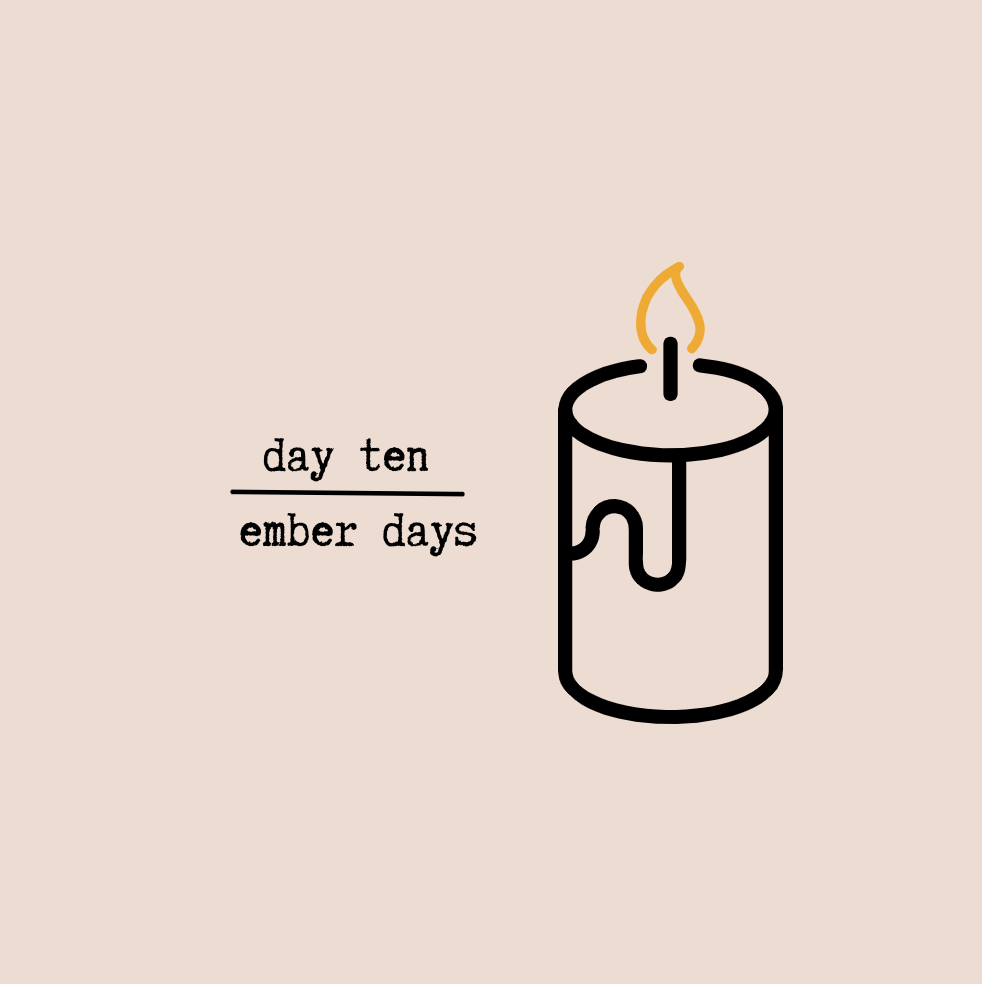Day Ten - Ember Days


Today's Reflection
by Hannah Blosser
Today, March 11th, aside from being a normal Friday during Lent, is also an ember day. What is an ember day? Most Catholics ask this question when ember days are mentioned. These special days of prayer, fasting, and abstinence have almost completely disappeared from the liturgical calendar, but were once a very important part of Catholic life. Ember days occur four weeks out of the year, and are always the Wednesday, Friday, and Saturday following a particular feast. The four ember weeks follow Ash Wednesday, Whitsunday (Pentecost), the Exaltation of the Holy Cross (September 14), and Saint Lucy’s feast day (December 13).
Why do the ember days come after these feast days in particular? The answer to this question has to do primarily with the seasons. Ember weeks fall during each agricultural season. Coincidence? Not really. The reason ember days were first implemented was as a way to sanctify an old pagan tradition in Rome. The Romans had special ceremonies dedicated to their deities for each season during the year, which were celebrated in June, September, and December. When the early Christians began converting the Romans, they retained this tradition, but implemented a new reason to hold these feast days. The ember days became an opportunity to praise God for all the blessings of nature, and thank Him for the crops that were a source of food and trade. Christians also took the opportunity to pray for a good planting season and harvest. Eventually the exact weeks of the ember days changed to their current places in the liturgical calendar, and Catholics all across Europe came to observe them.
Ember days are also a time to pray for vocations, because Pope Gelasius (d. 496) declared that ordinations should occur during the ember days (before, ordinations only occurred on Easter). This comes from the tradition of ordination after a period of fasting and praying, which can be found in Acts 13:3 (“Then after fasting and praying, they [the Apostles] laid their hands on them and sent them off.”) Ember days were traditionally days of prayer, fasting, and abstinence from meat, and preparing for ordinations in this way made sense from a liturgical and scriptural standpoint.
Are ember days still observed in the Church? In short, no. In 1966, Pope Paul VI declared that the ember days no longer had to be observed, and had them removed from the liturgical calendar. In the reforms of the Second Vatican Council, the practice of ember days was left to the preference of local bishops’ conferences, but in the liturgical confusion and agitation following Vatican II, these traditional elements of the liturgical calendar were pretty much forgotten. Some parishes, especially those which celebrate the Traditional Latin Mass, still observe ember days; even some Anglican churches have retained them in their calendars. But overall, the practice of fasting and abstaining from meat on these special days has died out.
Although observing the ember days is not an obligation, you can still do so, if you wish. It is a beautiful, traditional practice that goes back to about the third century, and is a time to thank the Lord for the gifts of nature and agriculture, and to pray for vocations. Ember days connect prayer and fasting with priestly and religious vocations in a wonderful way that perhaps should be more widely noted. The traditional observances to be followed on ember days are these: fasting (one full meal, and two snacks that do not equal a meal), abstinence from meat, and prayer. By observing the ember days, we can bring back a practice that has been part of the Church’s history for centuries.
An extra note on etymology: You may be wondering where we get the term “ember” day. The original name for these days was the Latin “Quatuor Tempora,” which means “four times,” hearkening to the four seasons during which the ember days occur. The German and English-speaking people came to call the ember days “Quatember,” a corruption of the Latin. So, the word “ember” comes from the Latin “tempora” (t-empor-a > empor > ember). We can still see this corruption of “tempor” in our calendar: For example “september” means “seventh time.”
(Bonus fact: The Spanish and Portuguese Catholics called the ember days simply, the “tempora.” You may be familiar with a Japanese dish called “tempura.” Tempura is not actually a Japanese word: it’s Latin! It comes from the Spanish/Portuguese Catholic missionaries to Japan, who wanted a meatless dish for the “tempora,” or ember days; and so, the now-popular tempura dish was invented!)
Prayer for God's Blessing on Our Labors
O Lord, graciously look down upon Thy servants and upon the work of their hands, and do Thou, Who givest food to every creature, bless and preserve the fruits of the earth, that the needy may be filled with good things and that all may praise the glory of Thy bounty. Through Christ our Lord.
Amen.
